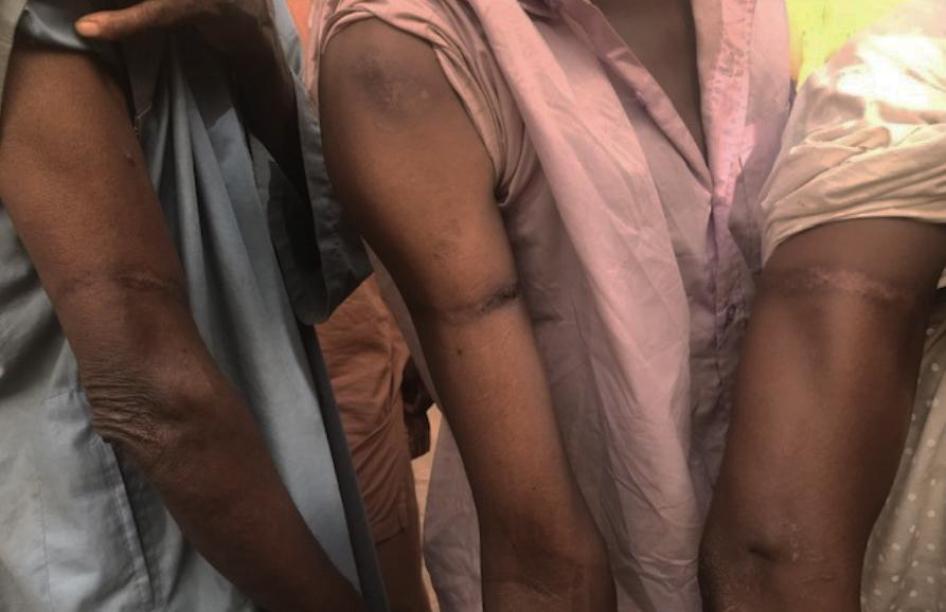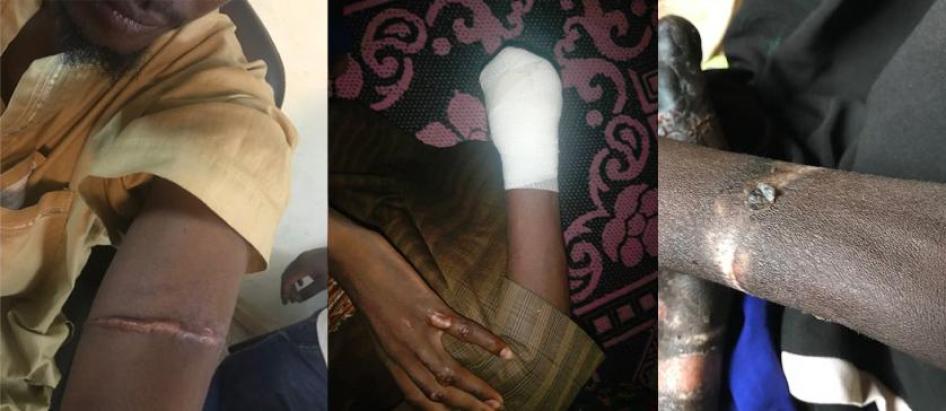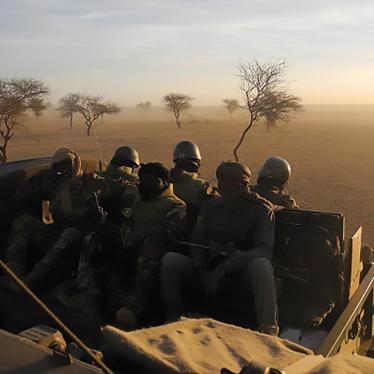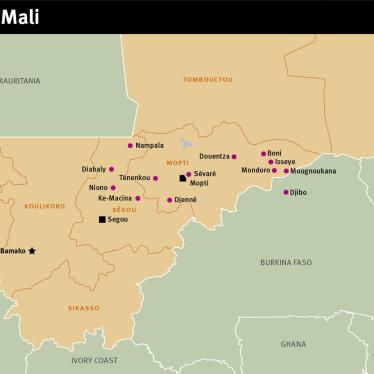Some Malian military units are using a method to restrain detainees during counterterrorism operations that has led to amputations and other serious injuries, Human Rights Watch said today. The Defense Ministry should urgently adopt international standards for treating prisoners and end the abusive practice, which amounts to torture or other cruel and inhuman treatment.
Former detainees who were held in central Mali in 2018 and 2019 told Human Rights Watch that soldiers bound their hands, elbows, or feet with rope, plastic cord, or their own headscarves, severely restricting blood circulation and often cutting through flesh. At least four lost limbs to amputations, while dozens of others suffered injuries, severe pain, and temporary loss of mobility.
In its response to Human Rights Watch, the Malian government said it is addressing the abusive practice through training and prosecutions of alleged abuse, noting their “determination to combat impunity in all its forms, particularly in the theater of operations carried out by the Armed and Security Forces.”
“The brutal techniques for restraining detainees used by some Malian soldiers is cruel, painful and has caused permanent disability,” said Corinne Dufka, Sahel director at Human Rights Watch. “The army should end this unlawful and inhumane practice and treat detainees according to international standards.”
The most recent abuses documented took place during eight government counterterrorism operations in the Mopti region between February 2018 and June 2019. Human Rights Watch interviewed 33 former detainees in Bamako and Sevare, all of whom had visible scars on their upper arms, wrists, or ankles. Human Rights Watch also interviewed family members, aid and health workers, and gendarmes. Human Rights Watch had previously documented dozens of similar abuses of detainees by the military between 2013 and 2017.
All former detainees interviewed said that they were accused of supporting or being members of armed Islamist groups that have committed serious abuses in central Mali since 2015. They said the military had arrested them while they were working in their villages, grazing their animals, or attending markets. They were bound, then transported to army bases, bush camps, or gendarme headquarters that were hours away – in some cases a drive of several days. They described being kept bound for between 12 hours and 8 days.
They typically said they lost sensation as their bound hands, arms, and feet swelled, causing the cords to cut into their flesh. Many said it took days and in some cases months for feeling to return, which health professionals told Human Rights Watch suggested possible nerve damage. Many said it became hard to eat, dress themselves, or work. Several said that doctors had to surgically extract the material used to restrain them from their skin.
In four cases, the loss of circulation led to gangrene and eventual amputation. Two men and a 16-year-old boy lost a hand or arm, and one man, who was suspended and burned while bound, lost both an arm and a leg.
Two of the people who lost hands were among over 50 suspects from around Mougnakana village, near the Burkina Faso border detained on December 14, 2018. They were blindfolded, bound with cords or their turbans, and driven to a military base in Gao, a two-day drive. Human Rights Watch interviewed 14 detainees, all of whom, four months later, had scars on their arms or wrists.
“As my arms swelled, the cord went deep into and cut my flesh,” a 44-year-old man said. “It was so bad the doctor had to surgically remove it. The doctor told several of us that ‘your hands are so bad they may need to be amputated.’ The pain was severe; I was ready to have it cut … My hands were saved. But two others, including a boy of 16, weren’t so lucky…both lost their hands. One is still in the hospital and the other was transferred to the central prison.”
Two witnesses said that the right hand of a 20-year-old man turned black and fell off several weeks after he was bound at the wrists with rubber cord for over 12 hours. The man was one of nine suspects detained on May 28, 2019 around Managou village, near the Burkina Faso border. One of the men said that while he and the other suspects suffered some degree of temporary loss of mobility, the young man, who had a mental health condition, was treated with particular cruelty, likely, he said, because he was perceived to have resisted arrest. Human Rights Watch spoke with the victim and has photographs of his injuries.
“The soldiers ripped our turbans and bound our hands and eyes,” one man said. “When [name withheld] spoke back to the soldiers, saying, ‘You can’t do anything, it is only God we fear,’ they went into a rage and tied his hands incredibly tight, with rubber cord used to secure baggage on a bicycle. They threw us into the vehicle like stacks of wood and drove us for hours until reaching their base in Mondoro.”
A relative who cared for the young man after his release said, “both hands were swollen; the right one had a deep gash at the wrist… it was infected. He had fevers for a month until it dropped off. Even now the left hand has no force.”
A 36-year-old animal merchant detained in a village near Ténenkou on April 24, 2018 lost a hand and a foot. Human Right Watch interviewed the man before his limbs, which had turned black, were amputated. The governmental National Commission for Human Rights is providing support to this man, whose lawyer has initiated a lawsuit against the state.
“I was taken to an army bush camp where my hands and feet were hogtied with plastic cord,” he said. “They hung me from a bar for over five hours… I was beaten with rods and they put something with fire on my hands and feet several times, while demanding, ‘Tell us where the jihadists are!’ I was freed two days later, but I cannot bear the pain. And now, how will I feed my family?”
The way detainees were transported appeared to exacerbate some injuries. A 28-year-old man detained in 2018 with deep scars on his arms said:
They dragged us from the village, beat and bound us two by two at the elbows, back to back, then threw us like sacks of rice into trucks. We travelled through Douna and Hombori, over rocky and rough roads. By the time we reached Gao two days later, and with all the bouncing and weight of people on top, the rope had cut deeply into my arm.
In July 2018, Human Rights Watch interviewed eight men who had been apprehended in February around the town of Mougnakana while bringing their animals to a watering hole. The men, all but one of whom had visible scars from the restraints, said they spent eight days at the National Guard base in Mondoro with their arms bound, except for short periods once a day to eat. Several described pain and loss of feeling five months after being released.
“They surrounded us at the well, screamed for us to hit the ground, then grabbed our turbans and tied our hands and blindfolded us with great force,” a 34-year-old man said. “Later they tied us with plastic cord. Some days they untied it for a few minutes to eat but I couldn’t feel… I had to be fed by other prisoners. Honestly, I couldn’t feel my fingers for months and even now, my left hand doesn’t have full feeling. I take pills all the time for the pain.”
Another man said: “Even today, five months later, I have lost feeling in my right hand, and it hurts. On the other hand, one finger has completely lost feeling.”
Those interviewed frequently implicated members of Mali’s National Guard, a unit under the Defense Ministry, based in Mondoro, near the Burkina Faso border. The abuse stopped after soldiers handed the detainees over to gendarmes, who, victims said, ensured that the most seriously injured received medical care. Many detainees said the gendarmes expressed anger over their treatment. “The gendarmes were angry at the soldiers,” a detainee said. “They yelled, ‘This isn’t right! You know very well this isn’t what you do to detainees.’”
The United Nations Standard Minimum Rules for the Treatment of Prisoners (the “Mandela Rules”) state that instruments of restraint should never be applied as a sanction for disciplinary offenses and that restraints that are “inherently degrading or painful” are prohibited. Restraints used must be the least intrusive method necessary and reasonably available to prevent flight, and they “are to be removed as soon as possible after the risks posed by unrestricted movement are no longer present.”
In a forthcoming report, Human Rights Watch will detail several cases of mistreatment of detainees, as well as cases of enforced disappearance.
On October 1, the Ministry of Defense and Veterans responded to Human Rights Watch’s findings, noting it was aware of and had investigated at least one of the allegations. The ministry said it was taking proactive measures to address the problem by way of training and increased efforts at accountability for allegations of serious abuses by soldiers, noting that in recent years numerous “cases of human rights violations have been systematically investigated and led to the prosecution of alleged perpetrators. To date, some 20 soldiers have been charged with murder, torture, kidnapping of persons, complicity in these crimes and breaches of instructions.”
Mali’s Defense Ministry should take urgent measures to end the abusive practice and ensure that gendarme provost marshals, who are responsible for ensuring discipline and detainees’ rights and have appropriate training, are present during all counterterrorism operations, Human Rights Watch said.
“Mistreating detainees, including those who have committed crimes, is not only unlawful, it’s shortsighted and counterproductive,” Dufka said.









